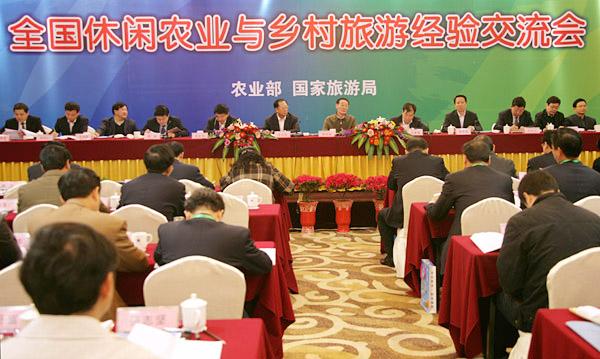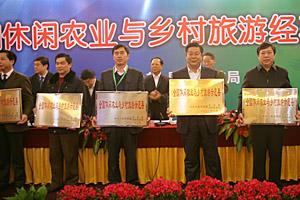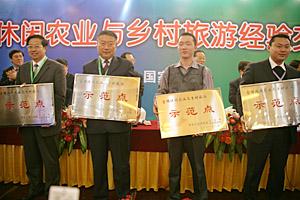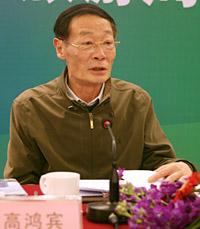By Liang Baozhong
www.moa.gov.cn
March 02, 2011

On 1 Mar. 2011, the Ministry of Agriculture (MOA) and China National Tourism Administration (CNTA) jointly held a national meeting on agri-tourism in Ningbo, Zhejiang to share the experience and practices in development of agri-tourism, make arrangements for priorities in 2011 and the Twelfth Five-Year Plan period, and release the list of 32 demonstration counties and 100 demonstration entities for agri-tourism approved in 2010.


Gao Hongbin, Vice Minister of Agriculture, pointed out in his address that this was the first meeting on agri-tourism jointly organized by the two agencies, marking a milestone in its development process. Development of this industry could create economic benefits for farmers, improve the outlook of the countryside, transform traditional agriculture and bring pleasure to urban and rural residents, which made it a sunrise industry worthy of attention.

Gao stressed the following principles for the development of agri-tourism. First, properly handle the relationship between government and market. Governments should manage the affairs under their jurisdiction duly and effectively to create a favorable environment for development of agri-tourism; and efforts should be made to give play to the basic role of market forces in resource allocation and encourage market players to engage in this industry in a bid to develop agri-tourism featuring more flexible and diversified operations, more viable mechanisms and more market-oriented services. Second, properly handle the relationship between farmers and other social sectors. Adhere to the basic principle of making farmers the major player in development of agri-tourism, establish and improve mechanisms and systems to protect farmers interests, expand the channels for participation of other social sectors under the precondition that farmers played a major role, and encourage inflow of human resources, funds, land and other factors into this industry to realize high-level and large-scale development of agri-tourism and maximize farmers benefits. Third, properly handle the relationship between development of agri-tourism and protection of farmland. Choose the development pattern appropriate to the local conditions rather than those purely pursuing large-scale operations or copying foreign practices and give priority to the types of agri-tourism that would require no or less use of farmland; advocate development activities on the land that were not suitable to grain production, such as barren hills and hillside, and tidal flats; promote efficient and intensive agri-tourism and stress increase in output and benefits per unit area; and strive to boost development of agri-tourism on the one hand and minimize use of farmland on the other hand. Fourth, properly handle the relationship between economic and ecological benefits. In the principle of focusing on both economic and ecological benefits, strengthen the guidance and regulation on agri-tourism and the education and training for operators and their employees to form a development pattern under which economic and ecological benefits contributed to each other. Fifth, properly handle the relationship between individual demonstration and wider promotion. Identify priorities and avoid blind expansion, and keep to working on both demonstration entities and wider extension facilitated by the successes in the former area to realize overall and scientific development of agri-tourism.

In his speech, Wang Zhifa, Vice Chairman of the National Tourism Administration, stressed that agri-tourism was in strongest need of support and assistance, given the fact that it led all forms of tourism with the greatest potential for growth, the closest connection with national economic and social development strategies and the most direct and effective approach to issues concerning agriculture, rural areas and farmers. In developing agri-tourism, we should focus on the following four areas. First, diversify the development mechanism. We would strive to form a diversified development mechanism by making full use of the role of the government and the market in a way that combines government coordination, market guidance and public support. At the primary stage, we should particularly give full play to the role of government coordination and increase government support. Second, press ahead with the development of industrialization. We would vigorously raise the level of organization, extend and broaden the industrial chain of tourism and establish an industrial system, featuring cooperation based on division of business and effective link between upper and lower stream sections. The goal was to realize harmonious development between primary, secondary and tertiary industries, and constantly increase comprehensive benefits of agri-tourism. Third, continue to develop agri-tourism with characteristics. We should highlight distinctive features of agri-tourism which, unlike urban tourism, was closely related to agriculture, rural areas and farmers in nature; adopt our principles for development, according to local conditions; and develop new products different from traditional ones to prevent homogeneous, low-level, featureless and simply-repeated projects. Fourth, continue to standardize our management, by setting up a sound standard system for stronger inspection and administration. Consequently, we would realize self-management, self-service and self-control of farmers and gradually transform imposed discipline to self-discipline in the management of agri-tourism.
It was proposed that agri-tourism industry would implement the following six major programmes during the Twelfth Five-Year Plan period. First, establish demonstration bases. Its establishment follows laws of development of agri-tourism industry and the market; takes into account features of regional resource, environment and culture; and encourages joint efforts and cooperation between industries and promote concentration of industries to put in place modern agri-tourism industry zones and groups with standardized farm production, intensified operations, regulated service and multiple functions. Such demonstration bases are of distinctive themes, salient features, rich contents, well-established industry and all functions required. Second, bring out native culture. The establishment dedicates to tapping native culture through collection and documentation to promote development of creative industries of native culture and enhance inheritance and protection of native culture and local customs. Third, provide training for employees in agri-tourism industry. Take training of this kind as a public programme and bring it into government financial support to provide training for more employees including managerial staff and attendants through making use of public institutions like agri-broadcasting schools; improve distance-learning programmes by making full use of modern media technologies in training; and increase support for IT application in development of agri-tourism industry. Fourth, create big-brands. MOA and NTA will continue to develop a number of agri-tourism demonstration counties, pilots and activities to create tourist attractions for the purpose of promoting its development level as well as social and economic benefits nationwide. Fifth, develop support systems. Focusing on development demand of the industry, speed up build its service platforms to develop support systems that integrate information service, management consultancy, marketing and promotion, logisticsand virtualdisplay to create a sound environment for its development; and strengthen establishment of designing and research system and centres with support of universities and research institutions. Sixth, develop infrastructures and basic facilities. Strive to have government financial support and attract non-government funds to develop infrastructures and basic facilities for agri-tourist production bases, roads, communications, treatment of effluents, exhaust gases and wastes, public safety and farming culture. Mobilize financial resources for introducing new plant varieties and animal breeds; demonstration of practices in modern crop/animal farming and aquaculture; equipment and facilities of protected farming operations; and production of green and organic food.
It is learned that in recent years, agri-tourism in China has been expanding in scale. According to incomplete statistics, agri-tourism has operated at a profit of more than 120 billion yuan annually, benefiting 15 million farmers. By the end of 2010, there have been more than 1.5 million Happy Farmhouses and over 18,000 large-scale Agri-tourism Parks nationwide, receiving more than 400-500 million person times from across the country. A multi-functional agri-tourism with a wide diversity of forms have taken shape, such as Happy Farmhouses, Leisure Farms, Agri-tourism Parks and Folk Villages, significantly expanding functions of agriculture and presenting a new way for farmers to start their own businesses and increase their incomes. Some changes have been made in many aspects of agri-tourism, such as development patterns, scale of operation, function, spatial layout and operators: previously it was organized by farmers themselves, characterized with separate management and single function, operated mainly by individual households, and situated in places around scenic spots and outskirts of urban areas. In contrast, now its development is supported by governments at various levels with planning and guidance; it features intensive and multi-functional operation, integrating recreation, education and experiencing; it has been expanded to more areas suitable for its development; and its farmers cooperatives and social capitals have played a predominant role in its operation. Guided by the principle of high-yield, high-quality, distinction and innovation, a group of popular brands have come into being, such as Five Golden Flowers (five tourist farms) in Chengdu, capital city of Sichuan Province; the Rape Seed Festival in Wuyuan County, Jiangxi Province and Luoping County, Yunnan Province; the Watermelon Festival in Daxing District, Beijing; the Chinese Bayberry Festival in Yutao city, Zhejiang Province and the Lotus Festival in Zhangjiajie, Hunan Province. Practices have shown that agri-tourism is a sunrise industry, which conforms to the laws of economic development, enjoys great potential for growth, holds a huge market and facilitates the settlement of issues concerning agriculture, rural areas and farmers. It is also considered as an emerging industry which has benefited the nation and the people and achieved multi-results with a few efforts. With it, agriculture could become more efficient, rural areas more beautiful and farmers better-off and more dignified.





